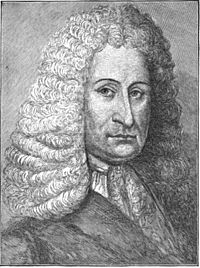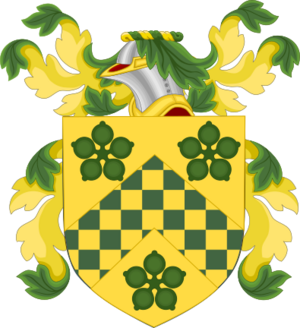Elisha Cooke facts for kids
Quick facts for kids
Elisha Cooke Sr.
|
|
|---|---|
 |
|
| Associate Justice of the Massachusetts Superior Court of Judicature | |
| In office 1695–1702 |
|
| Preceded by | John Richards |
| Succeeded by | John Leverett |
| Member of the Council of Assistants | |
| In office 1684–1686 |
|
| Speaker of the General Court | |
| In office 1683–1683 |
|
| Preceded by | Daniel Fisher |
| Succeeded by | John Waite |
| Member of the General Court for Boston |
|
| In office 1681–1683 |
|
| Personal details | |
| Born | September 16, 1637 Boston, Massachusetts Bay Colony |
| Died | October 31, 1715 (aged 78) |
| Spouse | Elizabeth Leverett |
| Profession | Physician |
Elisha Cooke (born September 16, 1637 – died October 31, 1715) was a rich doctor, politician, and businessman in early Massachusetts. He was chosen as the Speaker of the Massachusetts Bay Assembly in 1683.
Cooke led a group called the "popular party" in the Massachusetts Assembly. This group worked to protect the rights of the colonists from royal officials. His son, Elisha Cooke Jr., later continued this important work.
Contents
Early Life and Education
Elisha Cooke was born in Boston. His parents, Richard and Elizabeth Cook, came from England. He went to Harvard College and graduated in 1657 when he was 20 years old.
Cooke trained and worked as a doctor. But he also became very involved in politics. In 1673, he became a "freeman". This meant he had the right to vote and hold public office in the colony.
Political Career and Public Service
Cooke was elected to the colonial assembly, representing Boston, from 1681 to 1683. He was a strong voice for the colonists. In 1695, he became a Judge of the Superior Court. He also served as a Judge of Probate in 1701.
Cooke was a trusted advisor to Lord Bellomont, who became the Governor of Massachusetts in 1699. Cooke often stood up for the rights of the colonists against the wishes of the royal governors.
Standing Up for Colonial Rights
Elisha Cooke was known for fighting for the rights of the Massachusetts colonists. He was part of a group that disagreed with how some royal governors ruled. For example, after a revolt in Boston in 1689, Cooke was part of the group that took power from Governor Sir Edmund Andros.
Later, when Joseph Dudley became governor in 1702, Cooke lost his judge positions. This was because Dudley remembered that Cooke had been part of the group that put him in prison after the 1689 revolt. Cooke was a key figure in defending the colony's self-governance.
Family and Later Years
Elisha Cooke married Elizabeth Leverett in June 1668. Elizabeth was the daughter of Governor John Leverett. They had one son, Elisha Jr., who was born on December 20, 1678.
Elizabeth passed away on July 21, 1715. Elisha Cooke Sr. died shortly after, on October 31, 1715. He is remembered as an important leader who worked to protect the rights of the people in colonial Massachusetts.
 | Sharif Bey |
 | Hale Woodruff |
 | Richmond Barthé |
 | Purvis Young |


